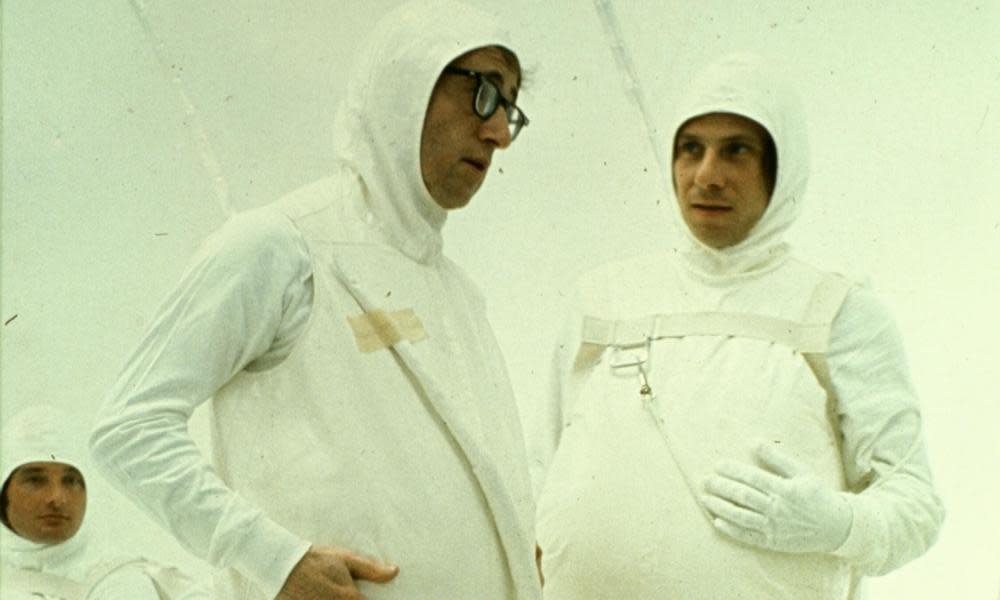Making babies is beginning to look as difficult for men as it always has been for women

Men. You had one job. And now look what’s happened! The sperm count of western men has fallen by half in 40 years. It is likely to decline further. This is a wake-up call. Human extinction beckons. Twitter, in its full nihilistic embrace, has welcomed this news as good. It is kind of funny. Sperm always is somehow, especially if your job description is harridan, as mine is. For although there are millions of the damn squirmers in every ejaculation, you only ever need the one, the tenacious one that can wiggle through if you want to get pregnant. Sperm flows freely, it seems, endless and abundant for men, who don’t have to worry about fertility. How many sperm do men produce? How many stars are in the sky?
The average man (although, obviously, I realise no man is EVER average) produces 14 gallons of ejaculate in a lifetime. Men produce more sperm than mice do, but a lot less than pigs. Biology is not destiny, but it certainly preoccupies us. Female fertility is always up for discussion in ways that male fertility isn’t. Even sober headlines say that, by the age of 30, women will have used up most of our “ovarian reserve”. We sit there with our limited and festering supply of eggs, which all went mouldy when we got an OK job and are now ageing faster than the rest of us. Our selfishness in wanting to be financially independent means that we may have to forfeit motherhood as a result – and on it goes.
This is called “choice”, sometimes even “choice feminism”, but it is no such thing. Reproduction, that most basic of acts, takes place in a cultural context that constantly assesses women’s need and capability based on some sub-Darwinian tripe about attractiveness and youth (let’s all be teenage mums, then?). It is constantly assumed that men can father a child whenever they feel like it because Mick Jagger does. Lately, though, doctors have told us that male fertility does decline with age, along with an increased risk of passing on genetic abnormalities. Begetting is beginning to look almost as complicated for men as it always has been for women. Any discussion of male fertility has to admit a vulnerability in the old breeding front. Or some mutuality. I have seen a good few women go through arduous IVF treatment because either their bloke had issues with issuing, or because of the more common inexplicable inability of couples to conceive. No one blames any one else, for this is the modern way.
Quality not quantity of sperm is what matters. It’s called motility. Sperm may be being produced by the jamjar, but the tiny swimmers may be too stoned, drunk, or unmotivated to get that deserving egg. Men are often advised, therefore, to stop drinking and smoking, wearing tight clothes and, er … sometimes to masturbate less. Self-love may have to be curtailed.
My heart bleeds. No, really it does, for I can see what is happening to men is what women have been putting up with for years. A collective problem is individualised into a lifestyle one. Eat well, be good, sleep, exercise, blah blah bah and all will be well. This is … how can I say it sensitively? Bollocks.
The decline is in the quality. Scientists pretty much agree that the cause of this is environmental. Plastics, oestrogens and pesticides are leaking into the water supply. Obesity, stress and what are called “chemicals in commerce” are also seen as reasons that sperm counts are dropping in the west, but not in developing countries. The modern world is making us barren.
It is all our problem but it remains difficult to discuss. My mother’s generation often talked of men “shooting blanks” and children being brought up by men who were not their biological fathers. This happened a lot in the war years. “Maternity is a matter of fact, paternity is a matter of opinion,” as they used to say, pre-Jeremy Kyle and the DNA of doom tests.
Anxieties about female fertility are always up for grabs, as the female anatomy generally is. Anxiety about male infertility erupts only in dystopia. In PD James’s 1992 novel The Children of Men, male infertility is the basis of the exploration of what happens when society can no longer reproduce. Where does hope come from? When Alfonso Cuarón remade this as a film, great though it was, he switched it to being about female infertility. In Gilead, the Christian fundamentalist state that is the setting of Margaret Atwood’s novel The Handmaid’s Tale, it is legally only women who can be the cause of infertility, thus Serena Joy’s subversiveness is in suggesting that her husband may, in fact, be infertile.
In the present-day real world, patrolling the lifestyle of men is only part of the solution, as it has been with women. This is not about one sperm getting to one egg. It is bigger. We are producing an environment in which it is harder to reproduce. How much more evidence do we need before we begin to conceive of what this means?

 Yahoo News
Yahoo News 
